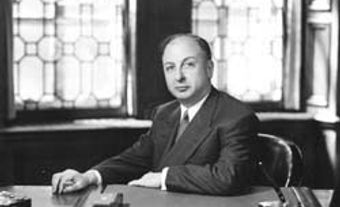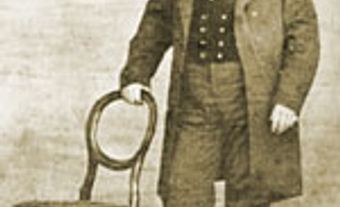Early Career and Family Challenges
Larry’s grandfather, Abraham Tanenbaum, arrived in Toronto from Poland in 1911. By 1917, Abraham had launched the Runnymede Metal & Salvage Company, setting the stage for the Tanenbaum family’s ties to construction and heavy industry. Larry’s father, Max, expanded the family business into multiple fronts, founding York Steel Construction Ltd., purchasing the construction firm Kilmer Van Nostrand (KVN) and acquiring a range of investment and real estate holdings. Larry launched his career in the family businesses by joining KVN as general manager in 1968, after acquiring a bachelor’s degree in economics from Cornell University in Ithaca, New York. While at Cornell, Larry worked as a student manager of the university’s hockey team, foreshadowing his later connection to the Toronto Maple Leafs. In 1975, Larry was elected president of KVN. He worked to diversify and expand the company, acquiring interests in cable company CUC Broadcasting and Warren Paving & Materials Group Ltd.
In 1980, Max Tanenbaum suffered a debilitating stroke, following which his wife Anne, and sons Larry and Howard, formed a committee to manage the family holdings. Further complicating matters, the family construction businesses struggled with sharp declines in building contracts and steel prices, while their capital holdings struggled with stock market turmoil. When Max died on 28 July 1983, the family contended with reports that Max’s fortune — estimated at $200 million — had largely evaporated. There was a protracted dispute over Max’s will, with his daughters Carol and Tauba disputing the committee’s management of the family estate. The dispute was eventually settled, but the public way in which the feud played out in the newspapers contributed to Larry’s later preference for privacy and limited dealings with the media — even when he grants interviews, he declines to give many personal details. He did, however, publically note that the painful affair was largely due to Max’s failing to put a succession plan in order for the family estate.
Sports Executive and Reluctant Public Figure
During the 1990s, Tanenbaum’s preference for limited press exposure became more difficult as he became increasingly active in the world of professional sports. One of his first forays came when he and some partners sought to acquire a National Basketball Association (NBA) team for Toronto. While the NBA rejected his bid to purchase and relocate an existing team, his interest led to the idea of creating a new Toronto-based franchise. However, Tanenbaum was deeply disappointed when a rival group, led by businessman John Bitove, won the bid for the new Toronto NBA franchise. Despite this setback, Tanenbaum managed to enter the professional sports world when KVN acquired a 12.5 per cent interest in the Toronto Maple Leafs and Maple Leaf Gardens from Steve Stavro. In 1998, Tanenbaum played an instrumental role in bringing the ownership of the Maple Leafs and Toronto Raptors together into a single ownership group, Maple Leaf Sports & Entertainment Ltd. (MLSE). The group oversaw the construction of the Air Canada Centre, a new stadium connected to Toronto’s central Union Station. In what colleagues described as a typical moment, Tanenbaum was not part of the group that publicly announced the deal that created MLSE, characteristically avoiding the spotlight. In 2003, Tanenbaum’s role in MLSE expanded further when he became chair of the board, replacing Stavro, who did not share Tanenbaum’s passion for basketball. The position occasionally requires that Tanenbaum address irate fans of Toronto’s sports franchises; for instance, in 2012, Tanenbaum penned a public letter personally apologizing for the performance of the Leafs. He has formed close ties with some athletes, famously using his private plane to help Raptors star Vince Carter attend his graduation ceremony and a playoff game on the same day.
Despite Tanenbaum’s preference for privacy, his profile means he occasionally becomes embroiled in political debates. The same year that Tanenbaum became chair of MLSE, it was alleged that a KVN-led consortium, Union Pearson Group, won the contract to lead the redevelopment of Union Station because of Tanenbaum’s personal connections to Toronto’s then mayor, Mel Lastman. Tanenbaum sat on the board of Borealis Capital Corp. with Lastman’s son, Dale. Ontario’s Ethics Commissioner eventually cleared the consortium of any ethical breach, though the incident exposed Tanenbaum to considerable political controversy.
While leading MLSE, Tanenbaum continued to spearhead KVN. The firm further diversified beyond construction and sports into the world of private equity. In 2001, the firm launched Kilmer Capital Partners Ltd., a private equity firm with significant ties to major institutional investors such as pension fund OMERS (Ontario Municipal Employees Retirement System) and various Canadian banks.
Philanthropist and Public Life
Tanenbaum and his wife, Judy Susan Lieberman, have three children: Kenneth, Julie and Lisa. Together, the couple have strong connections to Toronto’s Mount Sinai Hospital, donating $25 million for biomedical research in 2006, and another $35 million in 2013, prompting the hospital to name their primary research institute the Lunenfeld-Tanenbaum Research Institute. In 2016, the couple donated $20 million to the Montreal Neurological Institute, creating the Tanenbaum Open Science Institute in conjunction with McGill University.
The family continues to contribute to the Jewish community, a tradition that stretched back to Abraham Tanenbaum, who donated money for schools and community centres. In 2006, Larry and Judy provided the UJA (United Jewish Appeal) Federation of Greater Toronto with a $50-million endowment, to help fund a variety of community and charitable initiatives.
Tanenbaum received an honorary Doctor of Laws from the University of Toronto in recognition for his philanthropic work, including over $5 million in support of the university’s Centre for Jewish Studies.

 Share on Facebook
Share on Facebook Share on X
Share on X Share by Email
Share by Email Share on Google Classroom
Share on Google Classroom


